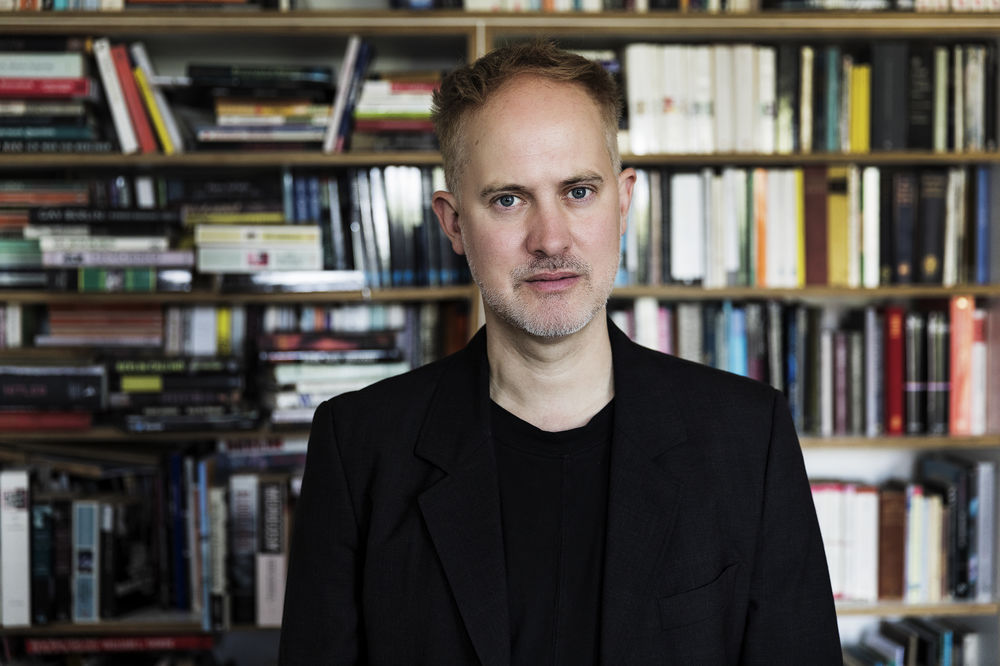
Pulling Back the Curtain on »Borgen«
by Joseph Pearson
10 February 2016
The three-season Danish mini-series »Borgen« (2010-2013) was a surprising success, to say the least. How is it that a drama of coalition politics in a tiny nation captured audiences in 75 countries? And yet, it wasn’t the political wrangling that touched people. Rather its moral universe. The central tension was always whether female PM Birgitte Nyborg would emerge from the corrupting influence of power untainted, and also remain a successful human being.
As Nicolas Stemann, director of the stage rendering of Borgen, premiering this month at the Schaubühne, told me: »It is not simply Borgen that has been successful of late, but political series in general. It is interesting that this is happening precisely at a moment when we are losing faith in politics and democracy, with discussions of ›post-democracy‹, questions about whether it is, in fact, politicians who have power, or whether that power rests with business interests. Is it possible to go into politics and have ideals and room to negotiate? With the world’s problems becoming ever more pressing, one can only hope politics can bring matters back into line. But when one does not believe anymore in effective democracies, one would rather look for hope on television. I think, in general, that is the reason for the recent great success of political series«.
We would be amiss then not to mention that other political dramatic series of late, which has captured viewers: »House of Cards«, with its Shakespearean overtones (Kevin Spacey famously said in an interview last year that the series would not exist without »Richard III«). In »House of Cards«, the guilty pleasure is to see leaders advance and then maintain power through nefarious methods. The moral universe of Borgen is the inversion of »House of Cards«. What they have in common is that both series have a clear moral center, but in Borgen the leader is doing her best to stay uncorrupted.
Stemann explains, »Borgen provides us with a positive political figure. The author expressly wrote the script with that intention: we want to give viewers back their belief in politics and democracy, to show that idealistic politicians exist, and to create a leader with whom we feel a strong association. This has been interesting for us to put on stage, to ask whether this is the case.«
We identify with Birgitte precisely because she emerges from each moral challenge unscathed. She survives the constant tests of corrupt politicians, the press, and spin doctors (her nemesis Lars Hasselboe is the instantiation of such manipulation). And, as Stemann explains, »If she weren’t successful, we would lose sympathy with her. And the series would lose viewers. She must remain a positive figure.«
If only the same success could be said of her family life. And I ask, »Isn’t Borgen a rather conservative morality tale: that women cannot enter politics without destroying both their family lives and their romantic relationships? Meanwhile, we are rather too used to men in careers disappointing their families?«
Stemann nods, telling me that this question interests him particularly, as he is in a relationship where both partners have to balance work with family. He explains, »As more women enter politics, the clearer this conflict comes into focus. I don’t think that this critical point is properly explained in the series and that the reality is brushed off. We start from the position: ›We are in Scandinavia, of course a woman can have everything‹ but we soon realize that the husband is in fact not at all ready to pay the price. The question is not whether women should participate in this system, but rather to ask how unhuman this system is if normal family life is not compatible with it? The conclusion should not be an anti-feminist position, but rather one that asks how careers are structured.«
Already, we are finding holes in Borgen, questioning its narrative spin, its crystalline moral fable. Walk through the door of the rehearsal hall and you will see a long table on which are scattered champagne glasses, a box of Danish butter cookies, a loudspeaker, a squat old-fashioned telephone, and theoretical texts on post-democracy. It is a working space for this inquiry. Around it the characters are constantly switching roles – putting on wigs, expressions, changing personas – as if trying different points of view. Stemann meanwhile stands, directing from a piano in the corner, which he plays from time to time to guide the action forward. The rousing theme from the television series swells – it strikes me as yet another enchantment to be dispelled. A voice calls out: »First season, episode four!« The Americans are using Greenland to transport prisoners to Guantanamo Bay. Prime Minister Birgitte Nyborg flies to the country within the Danish realm to inquire into matters – painfully aware of her colonial position, but also wishing to counter the injustice of extraordinary rendition.
The actors narrate the action from Borgen on the stage, but then there is a rupture. The PM suddenly interrupts herself, with a moment of self-analysis before a large video screen, projecting the image of her character from the series. She asks questions such as »Why are we here? Why should I care about what we are doing? Shouldn’t we be talking about the war in Syria instead?«
Here, perhaps is the contribution that staging Borgen can make, as a workspace on questions of narrative, identity and political action. To re-enact the 30 hours of episodes was never, of course, the plan. Instead, we see documentation, analysis, and an interrogation of moral coordinates. Stemann’s Borgen is an exercise in subjectivity, and one, as he has explained, that questions the series’ authority as a narrative of political integrity. With deconstructing spin, it pulls back yet another curtain.
Stemann explains, »The opportunity of theatre – in fact we are damned to this – is that here we are unable to reproduce the superficial reality of a television series. One always sees that it is fragmented, that it does not hold together, that a reality is being produced for us. And this is useful to alert us to the stories which are being sold to us by politics with an ideological purpose. We are offered the opportunity to ask the question: what is the ideology behind the series Borgen?«
The mechanism of this spin is something the company has taken seriously. I see piles of books – about lobbying, European politics, right and left-wing agendas for and against democracy – lying about the set, and Stemann tells me that they invited lobbyists to talk to the cast to investigate their methods. Since lobbyists train individuals in business and politics to be good actors, their presence here is perhaps not so surprising. The theatre becomes a place to unravel their performances.
»We had a number of consultants invited, so that we could understand them beyond the clichés. We have a good sense of how they are portrayed in series, but not how they operate in actuality. What really surprised us was just how lovely these people were. One we met works for big corporations, like Coca Cola, Google and Nestlé. At first, we felt like we were seated across from the enemy, and then within a few minutes he had completely impressed us with his charm. His position was that when one exerts influence, it is simply part of democracy. He noted that NGOs exert influence as well. I don’t share this position; I think lobbying is an enormous problem… In the end, what we found in our preparations was that our attempts to look behind the curtains brought us, finally, to the position of looking at the curtains themselves. We did not have the experience of finding something concrete that we did not know before, and so we turned back into the process of creation.«
We are finishing up our conversation, and I reflect that perhaps the myth of uncorrupted political life is something that we might need after all. Perhaps Borgen, which interrogates our relationship to democracy, our hopes for it, will be, in Stemann’s words, »our last hope in politics, that something good remains in it«.
I tell him that one compelling result of Borgen, discovered by researchers, was the way that it, in fact, improved political participation among viewers in Denmark. The problem is, that if we look at Denmark today, its political life is very frightening.
»Shortly after the transmission of the second season, a female prime minister [Helle Thorning-Schmidt] leading a minority left-wing party was elected in Denmark. But it didn’t last very long’, says Stemann, ‹The tragedy in this series is the declared objective of its author, that of someone who believes in democracy. The challenges of refugee policies, right-wing politics, are already present in the first season of the series. And in Borgen, the Prime Minister was voted in to deal justly with such issues. But, of course, this is something invented by the script writer. More recently, we have Kofi Annan writing an open letter about the terrible state of refugee policy in Denmark. Looking back, Borgen appears more and more like a fairy tale. But this kind of tragedy, in the end, is good for theater. There is a height from which we fall.«
Borgen
after the series written by Adam Price, developped with Jeppe Gjervig Gram and Tobias Lindholm
Version by Nicolas Stemann
Direction: Nicolas Stemann
Premiered on 14 February 2016
TrailerPearson’s Preview

Archive
January 2015
Celebrating Evil: Richard III at the Schaubühne
December 2014
An Autopsy of the GDR: Armin Petras’ Divided Heaven
| Page 9 of 10 pages |
